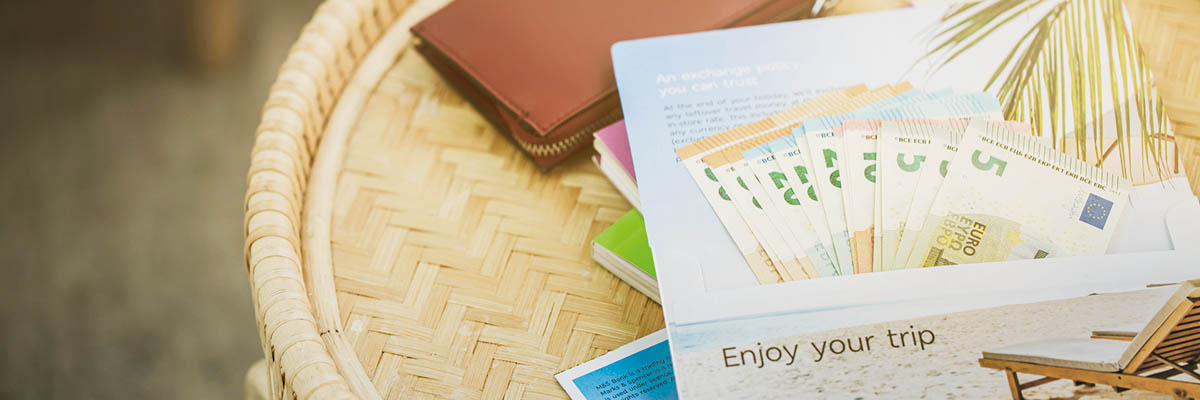Getting away from it all for a break with your nearest and dearest is one of life's great pleasures. But amidst all the excitement, it's easy to go into 'holiday mode' with your spending, too. And returning to an eye-watering bank statement or credit card bill you weren't expecting certainly won't help cure your post-holiday blues.
Fortunately, it is possible to avoid some of the most common spending pitfalls we tend to make on holiday. Here's our holiday money saving tips and advice to help you stay on top of your finances when abroad.
Mistake 1: Waiting until the airport to change your money
The all-important holiday prep that comes before you jet off can seem overwhelming - from sorting out your travel insurance, to choosing the best holiday outfits. But getting your travel money sorted in advance is one you don't want to miss off your to-do list. Why? Getting your pounds converted at the airport could cost you much more than if you do it in advance as you're likely to get a higher exchange rate. This is because airport-based bureau de changes know they're often your last chance to exchange your currency before you arrive at your destination, and so can get away with charging higher rates. As well as the added expense, it's no fun rushing around an airport trying to get your currency sorted at the last minute. Save yourself some money (and airport drama) by buying in advance instead.
Mistake 2: Paying in pounds
Many shops, restaurants and bars abroad will give you the choice of paying in pounds or in the local currency. While it might seem easier to pay in the currency you're familiar with, it can cost more.
Put simply, when you pay in local currency, you're paying your bank's exchange rate, but when you pay in pounds, the foreign bank does the calculation instead - meaning you could end up paying a higher rate.
So, whether you're withdrawing cash from an ATM or picking up the bill after dinner and cocktails, it usually pays to take the local currency option.
Mistake 3: Falling into tourist traps
It happens to the best of us. You think you're sitting down for some lovely local cuisine, only to find the food doesn't taste that great and, even worse, is incredibly overpriced. Unfortunately, falling victim to a tourist trap can happen when you're abroad, as owners are aware that holidaymakers are potentially less savvy about what things should cost and where to get the best deal.
Here are three holiday spending tips to help you avoid getting caught out when you’re next away…
- Do plenty of research before you go. Generally, reviews will tell you what you need to know to find authentic establishments with good, honest pricing.
- Step off the beaten track. Tourist traps tend to be in destination hotspots that get lots of footfall - think town squares, riversides, etc. If you want to see how the locals live (and pay their prices), try somewhere different.
- Go by recommendations. Don't be afraid to ask your hotel - or a local - to point you in the direction of a well-priced bar or restaurant.
Mistake 4: Not understanding foreign currency
It's easy to be frivolous with your money when you're on holiday - after all, it's your time to enjoy yourself. But while many of us are familiar with how currencies like euro and dollars compare to the pound, for others, like the Hungarian forint, it can be much harder to work out how much you're spending.
This means you could end up paying for things that are over your budget, and in some cases get overcharged (or short-changed) by staff who know you're a tourist.
Your best bet is to keep a currency converter app on your phone, then use it to check the amount of purchases like restaurant bills or souvenirs against the pound. That way, you're less likely to encounter any nasty surprises.
Mistake 5: Leaving your foreign currency behind
Returning home with some spare cash? It can be easy to forget how much it's worth and dump it in a drawer or blow it on something you don't need at the airport. But you might wish you'd waited and changed it back instead.
Our research1 has revealed that on average, each British home has £97.74 in foreign currency left over from past holidays, sitting in cupboards and drawers. So next time you travel, give the duty-free temptations a miss and change your foreign currency back to pounds, so you can spend your leftover money on something you really need. Alternatively, if you would like to donate your unused foreign currency to charity, we have Change4Change collection boxes in store with all the money collected going to Breast Cancer Now. Since 2007, we have raised over £630,000 for the charity via your Change4Change donations.
Top tip: It can be annoying to land in the UK with your pockets full of coins in foreign currency. So, if you've got enough, change your leftover travel money up into a note or two of the local currency before you return. It'll make it easier to change it back into pounds when you get home (and make you more likely to do it).
Source1 Have a sterling Christmas, M&S Bank research, November 2019
Published: 31 July 2018
Updated: 25 July 2022
